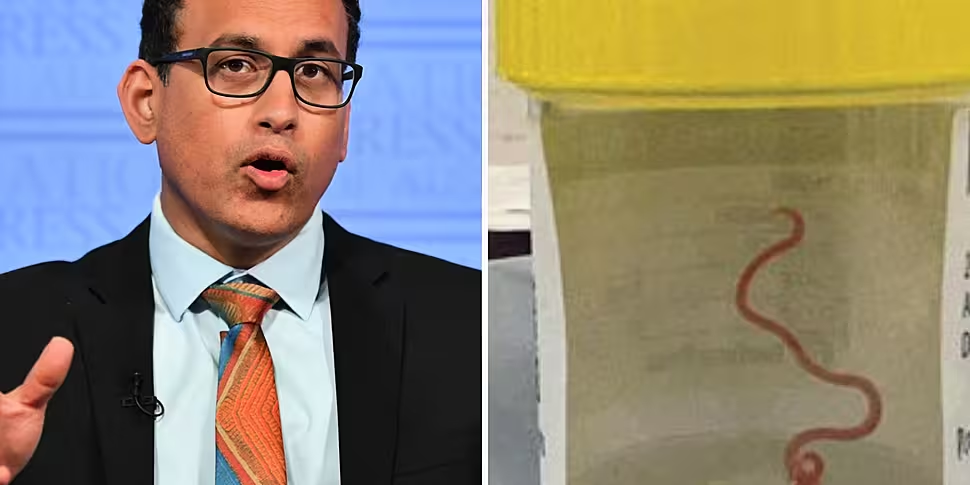A live roundworm pulled from a woman's brain 'probably just got lost on its travels', a doctor involved with the procedure has said.
The world's first case of a new parasitic infection in humans has been discovered by researchers in Australia.
The roundworm was removed alive from the right frontal lobe of a 64-year-old woman.
Researchers at The Australian National University (ANU) and Canberra Hospital detected the eight-centimetre roundworm from a carpet python in her brain.
The 'Ophidascaris robertsi' was pulled from the patient after brain surgery – still alive and wriggling.
Researchers say the woman likely caught the roundworm after collecting a type of native grass to use for cooking, beside a lake near to where she lived in which the python had shed the parasite through its faeces.
 A magnetic resonance image of the patient's brain shows a right frontal lobe lesion. Picture by: Canberra Health Services
A magnetic resonance image of the patient's brain shows a right frontal lobe lesion. Picture by: Canberra Health ServicesDr Sanjaya Senanayake, infectious diseases specialist at Canberra Hospital, told Moncrieff the patient initially presented with non-specific symptoms.
"Some tummy pain, diarrhea, a bit of a cough, some night sweats and she had also had some abnormalities on her scans in her liver and her lungs," he said.
"One of her white cell counts, which can be up with a parasitic infection but with other things as well, was also elevated.
"So you had that constellation of unusual features."
'Abnormal mass'
Dr Senanayake said they then moved on to rule out common parasites, and the woman seemed to improve.
"She seemed to settle, but then later on she started to find that she was a bit more forgetful than usual, a bit less happy than usual.
"That clever GP did an MRI scan of the brain, because she was worried that something might be going on there.
"Sure enough there was an abnormal mass in the front part of the brain.
"We all thought it might be maybe a cancer, maybe an abscess - but everyone was very surprised when she removed a live, wriggling 8cm worm from this woman's brain."
'Horror and relief'
Dr Senanayake said the woman in question was understandably shocked.
"Cleary she was obviously horrified, but given that she'd been sick for so long and we'd now got the diagnosis... that also brought her some relief," he said.
"So, I think a mixture of horror and relief."
Dr Senanayake said the woman may have become an "accidental host" after handling or directly consuming contaminated grasses.
'First time inside a human'
He explained how the parasite could have ended up in her brain.
"There are parasites that do live in humans, and they've got the propensity to spread to all sorts of organs," he said.
"It may not necessarily have wanted to go to the brain, but just in its wanderings it ended up there.
"For this parasite, it would have been the first time it had been inside a human.
"As far as this parasite goes in animals, we looked hard and couldn't find any evidence of it invading the brain of a marsupial or a small mammal.
"So, it probably just got lost on its travels."
 The worm removed from the patient’s right frontal lobe. Picture by: Canberra Health Services
The worm removed from the patient’s right frontal lobe. Picture by: Canberra Health ServicesDr Senanayake said the woman has now fully recovered.
"We made sure we gave her many weeks of anti-parasitic treatment after the operation," he said.
"She went home and has been in the community ever since," he added.









